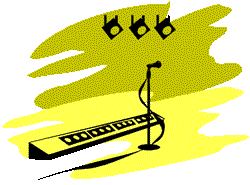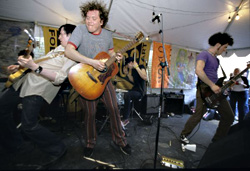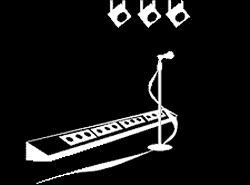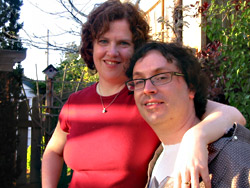The sun was sinking through Jazz Alley’s lightly curtained windows when Andy Bey hit “Midnight Sun” during each of his sets last Tuesday and Wednesday evenings. The room grew darker as the bass-baritone made his way through Johnny Mercer’s painterly lyric, using his four octaves to stretch Lionel Hampton’s melody with a couple of alarmingly guttural ahhhs and meeting the midrange to declare, “It’s a thrill I still don’t quite believe.” Even his wordless count-offs, barely more than rhythmic breaths, command an intimacy rare in any genre.
At 65, singer-pianist Bey is slowly moving toward recognition. (The 50-year-and-then-some veteran went unmentioned in Will Friedwald’s 1992 Jazz Singing, an omission that would no doubt be corrected today.) He arrived in Seattle a fairly late addition to the downtown club’s schedule, riding a wave of salutes for last year’s recording, American Song (Savoy Jazz). Bey leaned heavily each night on the record’s tune stack. The disc seems calculated to ease the underappreciated Bey past jazz gatekeepers—it resulted in his first Grammy nomination—while staying true to his beatific, slightly gritty vision. In Seattle, the classics on offer included some less-celebrated nuggets. No Nick Drake, despite the inclusion of a definitive “River Man” on the 1998 Shades of Bey, but there was a lovely take on the obscure Nat “King” Cole single “Never Let Me Go.” His fluttering piano solos on that song were like the visitations of a romantic sage.
Bey took “Speak Low” (or, as he introduced it, “Speak Softly and Carry a Big Stick”) from near the bottom end of his range to a high boil, repeating Kurt Weill’s verses about time’s thievery as if willing it away. He shifted between the sound of a man urging, “Better do it soon,” to that of a church sister voicing equal urgings. “Caravan”—the subject of another corny joke substituting Juan Valdez for Duke Ellington’s trombonist Juan Tizol, its composer—was a hard ramble across the desert, Monkish chords supporting the promise of respite at the end of the journey.
Bey spent half of his time away from the keyboard, relying on acoustic guitarist Paul Meyers to cover his discreetly chosen moves. Sting’s “Fragile” was stripped to its root, a calm protest against war a thousand miles away from the lull of smooth jazz. In a real surprise, Bey answered a listener’s encore request for “Celestial Blues” to close Tuesday’s show. Expanding on his funk-era call for discussion “with the heavenly bodies,” he and Meyers entered a floating groove-state that felt magical, and perhaps a little rueful. That ruefulness colors so much of what he sings and plays, but it’s the expression of someone who’s not giving in yet. It may be foolish to hope for a singer to teach us much, but if anyone’s wisdom is worth hearing, it’s Bey’s. He’s certainly ready to share.








